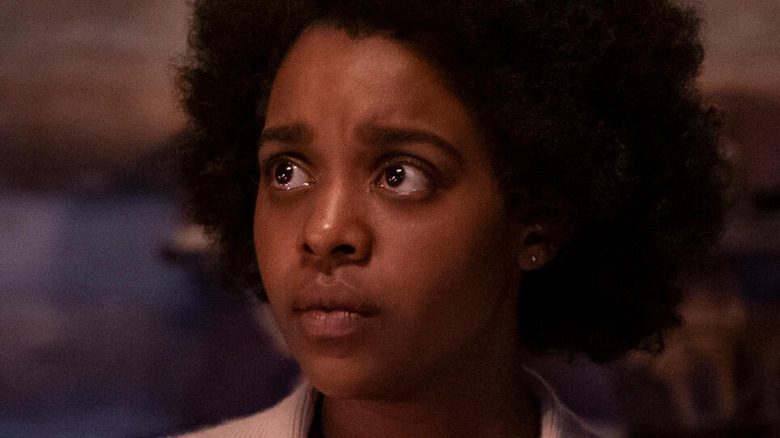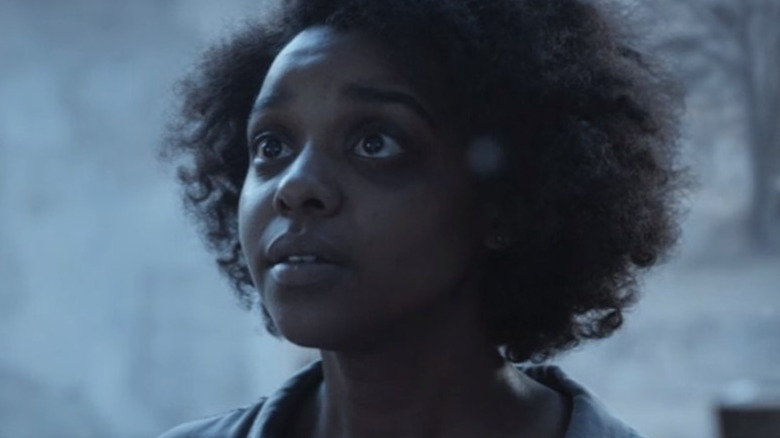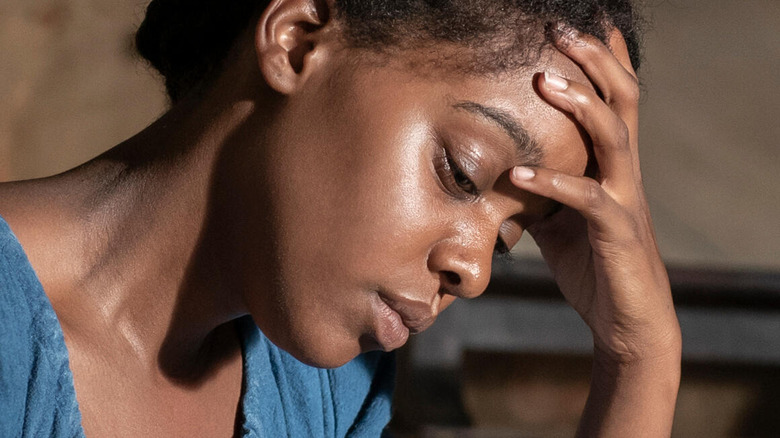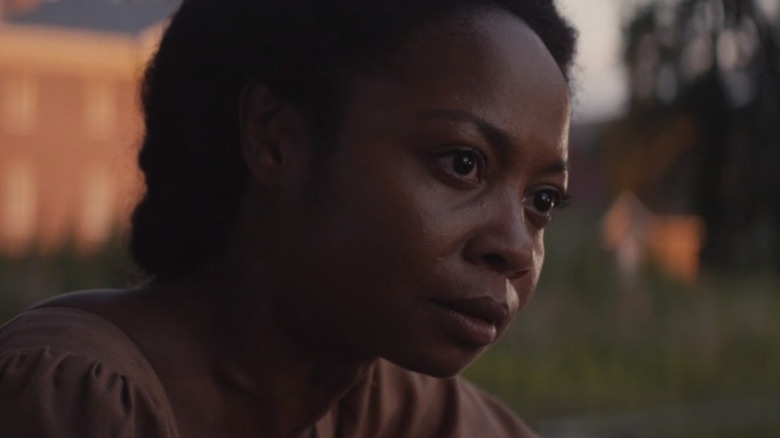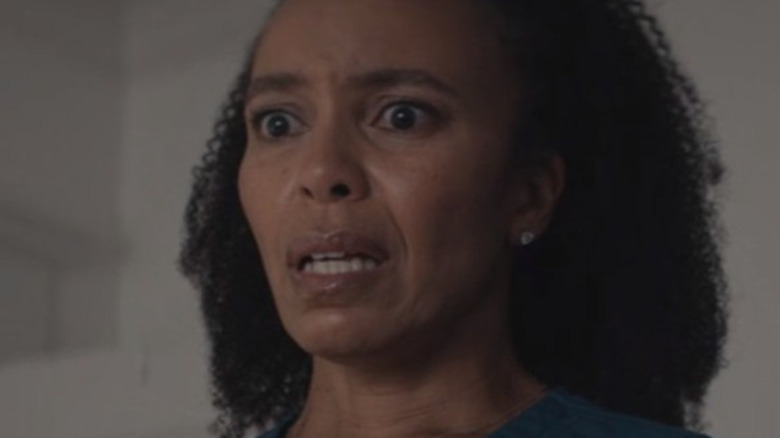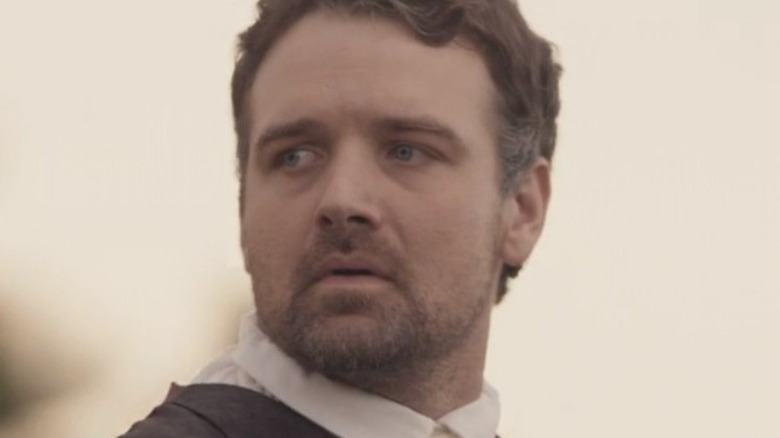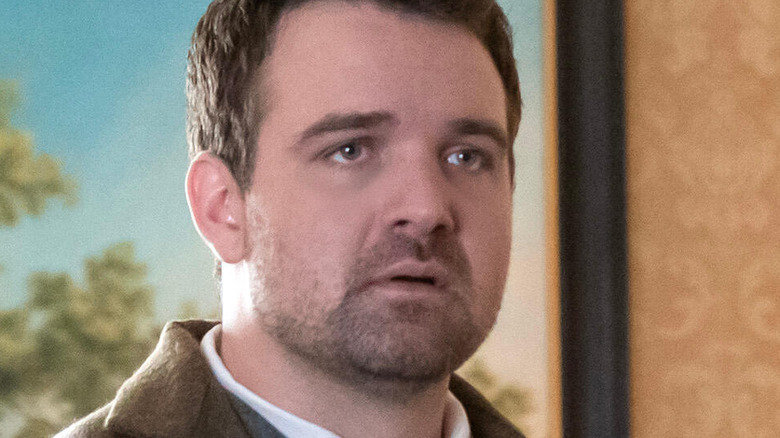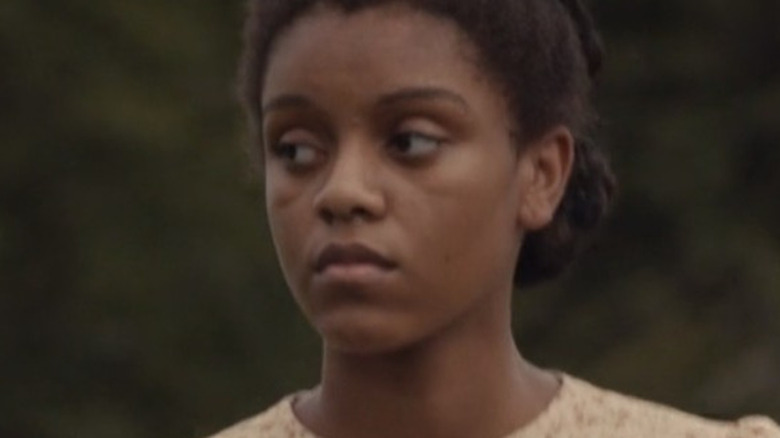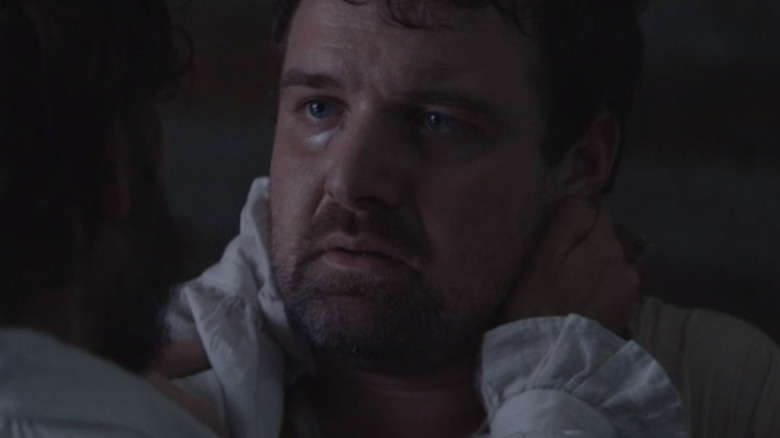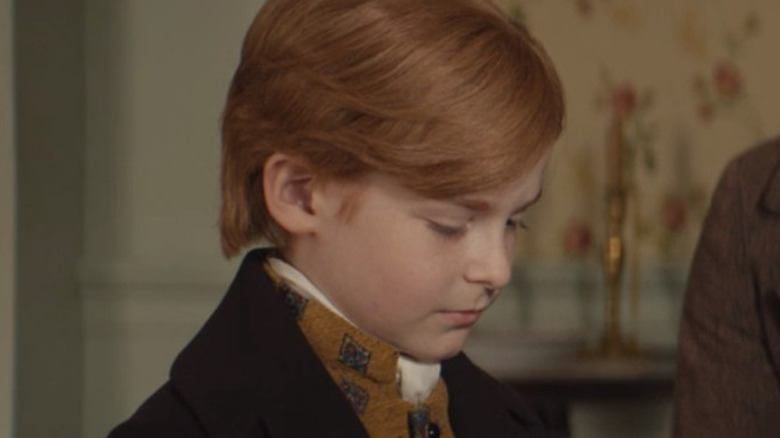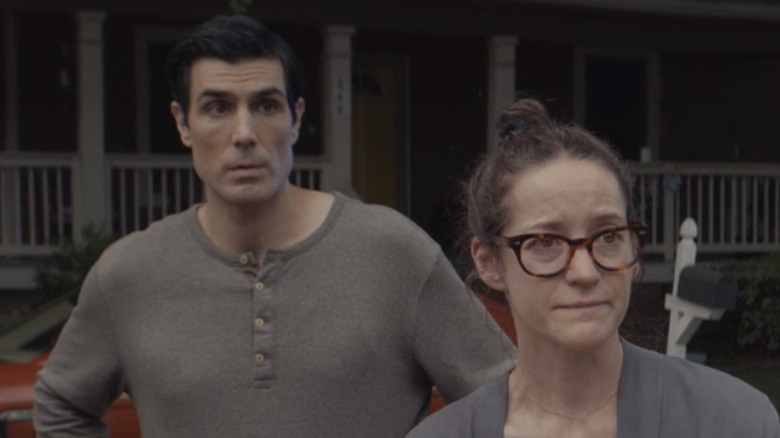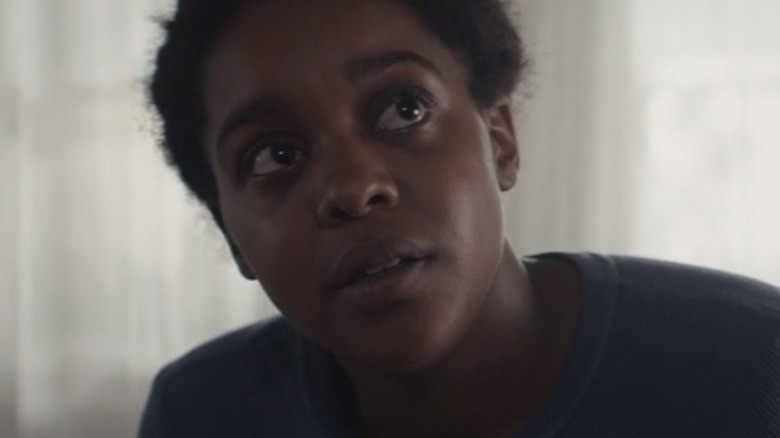The Ending Of Kindred Explained
FX has adapted the Octavia E. Butler book "Kindred" into a series. Described as a "grim fantasy," it follows Dana (Mallori Johnson), a young woman who has just moved to Los Angeles to pursue a career in television writing. Soon after arriving in her new home, she suddenly deals with strange occurrences that seemingly take her back to the American South of the 1800s. What she believes to be an incredibly visceral dream sequence becomes a new reality the more it happens.
Dana's aunt Denise (Eisa Davis) doesn't believe her. She thinks history is repeating itself because Dana's mother Olivia (Sheria Irving) had similar visions before her death. The only person who believes the young woman is Kevin (Micah Stock), a waiter who helps her get home from his workplace and becomes her only friend in her new home. He winds up accidentally following her to the past and experiencing the 19th century with her firsthand.
As "Kindred" Season 1 comes to a close, Dana is trying to figure out why she is being called to the past and how she can make it stop. Let's break down all the details revealed in the final episode of the adaptation, from where each character is (or isn't) to what Dana's revelations could mean for the future.
Dana may have discovered what's pulling her back in time
When we meet Dana, she is regularly pulled back in time. As the final episode comes to a close, that hasn't changed. In fact, she seems to be getting transported to the 1800s more often. After Thomas (Ryan Kwanten), the plantation owner, begins to whip her for reading, she reappears in the present day. She believes she can go back when she fears for her life, which tracks with the times she's been able to return to reality.
The 26-year-old tries to share her experience with her aunt Denise, and while she seems receptive, especially since she watched her niece disappear from a closet, there is clearly still some skepticism behind her eyes as she promises to help. Dana isn't entirely sure why she and her mother were called to the past, but she thinks it has something to do with Rufus (David Alexander Kaplan), the young white boy she repeatedly saves.
She travels to the past when Rufus is in danger. The first time is when he's a baby, flipped over on his stomach with the potential to suffocate. The next is when he is drowning in a body of water near his home. Then it's rescuing him from a house fire and finding him after falling from a tree. Just like Dana needs to fear for her life to be sent home, Rufus needs to fear for his life for Dana to be pulled back in time.
And she thinks she knows how to make it stop
While speaking with her aunt, Dana voices that she thinks it will stop if she "make[s] sure [her] next ancestor is born." Denise recommends checking the family bible, which lists their ancestors and birth years, thinking it could help her determine which ancestor she needs to make sure is born.
In reading it, she identifies Rufus in the list of names, as well as who she believes her ancestor is. It looks like she is meant to keep Rufus alive because he's the father of her ancestor. Could she and her mother have been transported back this entire time to ensure their predecessor is born? Are they trying to ensure their history is maintained, or change it in trying to keep Rufus alive? That isn't entirely clear, but it's obvious there is a connection between Rufus and Dana's family.
If Rufus is the father of her ancestor, that means he either slept with a freed slave or one he owned, adding to the repressed trauma the series focuses on. Dana knows the impact slavery and these actions had on future generations and populations, and understanding that it is a part of her family line is something that will be difficult to come to terms with.
She believes Alice is the woman with whom Rufus fathered a child. Alice is the young girl living with Olivia in the cabin. She and Rufus are about the same age, so it isn't surprising that, if Rufus is a part of Dana's family tree, it's through Alice.
Olivia is alive in the present day
In bringing Olivia back to the 21st century, Dana's life is about to change. Her mother was presumed dead in New York, and because that was the last place she was, it's where she reappears. Audiences watch this happen from afar as Denise receives a phone call about the police finding Olivia. Because she didn't appear with Dana in Dana's home, audiences aren't initially sure if Olivia had actually made it back, or if her status in the present day changed her ability to return.
With Olivia now brought back to the present day, how will that influence their lives? Though she has been aging in the 19th century, because it's been established that time passes differently between the two time periods, it's likely she hasn't aged as much as her family would expect.
She was pronounced dead after her car ended up in a river. Her family has grieved that loss, only to now be told years later that she has been alive, albeit not in their century, this whole time. This revelation is sure to send shockwaves through the family and present new challenges that Dana has to face in addition to ensuring her ancestor is born.
Denise doesn't react well to Olivia being found
When Dana's aunt receives the phone call informing her that Olivia is alive, her immediate response is to throw her phone on the ground after repeating her sister's name in a questioning tone. She is receiving this information through her husband Alan (Charles Parnell), who receives it from the New York Police Department. It isn't clear how they found Olivia so quickly. Due to her location when she disappeared, it's likely she attracts immediate attention. She is transported back to the river her car was in, so reappearing there is sure to gain an audience.
Denise's reaction to finding out her sister is alive is understandable, but it also speaks to the dynamic between them, which has been hinted at throughout the series. This response gives further insight into it. It isn't initially happy. Someone throwing their phone on the ground at hearing a dead relative is actually alive is a knee-jerk reaction. She doesn't show any signs of emotion, which could be seen in a negative light. The episode ends right after this, giving audiences nothing else to see to evaluate Denise's feelings on the situation.
Kevin has made a life in the 1800s
When Dana is transported back to the present day with her mother, Kevin is not. He has to be touching Dana to move through time with her, so when she disappears, he is trapped in the 1800s. She is worried about him, wondering how much time has passed while she is in the 21st century since time moves differently between the two. While she is crying about what could be happening to him, audiences are shown the direction his life has taken.
There has been a significant time jump, and Kevin is now a slave owner and presumed landowner. Viewers watch as he's on a horse, traveling through land while his slaves are bound together, forced to walk on foot. We know there is a time jump because he calls to Alice, a slave woman, and it's implied to be the same Alice that we saw earlier, who wasn't an adult. This causes some questions that we may not have the answers to unless there is another season.
While in the 19th century, he passes himself off as a working musician. However, if he now owns slaves and the land that likely comes with that, his occupation has to have changed. If Kevin owns Alice, he may have taken over the Weylin plantation due to Rufus' disappearance. This could mean he is a farmer, yielding what he can from the land for a profit.
And he has adapted to a perceived role
When Kevin had to blend in during his and Dana's visits, he pretends to be a musician. While they have to pretend Dana is his slave, he treats her much differently than Thomas treats his slaves, clearly unsure of his actions and not comfortable with the dynamic they have to portray. That's gone in the new Kevin.
Just like Dana has to adapt to being a slave, in the end, Kevin has finally succumbed to his perceived role. As a white man, it's assumed he owns slaves and treats them in a particular way. Thomas is surprised at how Kevin treats Dana. Kevin brushes it off, giving excuses because he can't bring himself to actually act as Thomas does.
That's changed now that he has had to create a life in the past. His treatment of Alice shows a completely different side of the character. He has fully committed to his perceived role in the past, which is that of a place of power due to his sex and race.
Not only has he taken on the role, but it also shows that he always had more authority in the situation. He wasn't forced to quickly adapt to a new role the way Dana was. There was no buffer room when it came to Dana being a slave. However, he could make excuses for his own behavior and hardly be questioned. It's showing a power balance that was always in their relationship, even if he never admitted to it.
The young girl on the horse may be the ancestor
While Kevin is shown on a horse with his new life, there is also a Black girl on a horse. Her skin tone is lighter than the slaves, which could imply that she is the product of a slave owner sleeping with one of his slaves. She isn't tethered to the slaves, instead getting to ride an animal and travel in a different way than the rest. Why is that?
Dana believes she is being transported back in time to make sure her ancestor is born. She also thinks that the ancestor is a result of Rufus sleeping with Alice, a slave that is around his age. Alice is there with Kevin, showing she has survived. Could the girl on the horse be the ancestor Dana is trying to ensure is brought into the world? Could she be the child of Alice and Rufus (or even Kevin)?
Based on her age, she looks to be in her late tweens or early teens, which could fit the timeline Dana has in mind. Her being on the horse, showing she has a different role in the unit than the slaves, could signify that she is freed due to who her father is. If she is half-white, she may be afforded a different life than a slave. The passing shot of her isn't enough to determine who she is, but she is given screen time for a reason.
Kevin's sister is concerned
Kevin has adapted to life in the past. There's no telling if he will ever have the chance to come home, as that would require Dana to be pulled back and for her to successfully find him. That's assuming he remembers her or anything about his life in the 21st century when/if she finds him.
Kevin's sister Penny (Elizabeth Stanley) goes to Dana's house, trying to find her brother because she can't get a hold of him; Dana answers his phone when she calls. She meets Dana's nosey neighbors Carlo (Louis Cancelmi) and Hermione (Brooke Bloom), seeming to agree with them on their views of what's happening in the neighborhood. They take her in, offer her coffee, and give her their version of what they think is happening.
When Olivia disappeared, it was as part of a car accident in a body of water, so she was presumed drowned even when they couldn't find a body, but Kevin has just vanished out of thin air. Dana has no explanation for where he is, but she has his phone. Penny doesn't seem to know what to think and is worried. She reveals he has a difficult past with substance abuse and seems to fear he's fallen into that again.
Rufus' location is unknown
During the final episode, Rufus and his mother Maggie (Gayle Rankin) leave the plantation, running away from Thomas. Maggie is concerned about the life her son will have if he follows in his father's footsteps. Thomas is a drunk and doesn't seem to be managing the plantation well, having to sell portions of his property to make ends meet. He decides it's time for Rufus to learn the family industry, removing him from school and encouraging him to drink in excess.
When Thomas finds out that his wife and child have fled, he sends one of his men after them, but only to get Rufus. His son is all he cares about. Audiences aren't shown if Rufus is brought back to the plantation or what happens next in his life, and Dana isn't immediately pulled back to the past the way she sometimes is. That could mean Rufus hasn't had to fear for his life yet, but there is no way of knowing exactly how much time has passed in the short time Dana has been back in the 21st century.
Regardless, audiences are left to wonder where Rufus is. With the appearance that Kevin has taken over the Weylin plantation based on the slaves he owns, it's possible Thomas was never able to find his son. However, Kevin could have simply bought the estate from him, meaning Rufus wouldn't inherit it anyway. With no knowledge of what happens to Rufus after he leaves the property with his mother, audiences are left to speculate in what direction his life goes.
Hermione and Carlo are sharing their story
In connecting with Penny, Dana's neighbors are sharing what they think is happening in her house. They are assuming drugs are involved, potentially due to her race, and have already made it clear they think Kevin is abusing Dana in some way. They feel she, and by extension Kevin, don't fit in with the neighborhood. This causes them to borderline stalk Dana and Kevin, peeking in windows and watching them like they are a late-night drama series.
They've made it clear they will continue trying to find out what Dana is up to. They wind up bringing Penny into the fold. Viewers are left to wonder what else they are going to tell her, how it will impact Penny's actions, and how they will continue to act around Dana, especially with Kevin's disappearance.
Carlo and Hermione are playing the modern-day role of the plantation owner. Like Maggie, Hermione is trying to insert herself into situations that don't involve her, wanting her voice to be the one above all else. Carlo disregards some of what Hermione is saying, just as Thomas does with Maggie, but he still supports her in the end.
Though social dynamics have changed, the white-passing couple is still trying to control Dana. They want her to not make noise and to conform to their vision of society, just as Thomas and Maggie do when she's in the past.
Dana has experienced intense trauma
The series focuses on the trauma rooted in being Black in America. Dana knows her ancestry includes individuals who were slaves. That's something she will always have to carry with her, knowing what happened to her ancestors and how they were treated in American history. Going back in time causes her to confront this trauma head-on.
In posing as Kevin's slave, Dana has to directly experience the oppressions and aggressions her ancestors did. She deals with people calling her slurs, treating her like a second-class citizen, and even being subjected to hard labor and corporal punishments like lashes. Rather than understanding the hardships of her ancestors and slaves as a whole, she is now a part of it. The only way out is to fear for her life, which isn't always in her control.
However, it's with a different lens. Because she knows the outcome of slavery, and how it has continued to impact Black Americans in the 21st century, she has to deal with knowing how this experience will impact her life when she gets home. The trauma and injuries don't go away just because she is called back.
As her aunt tends to the wounds caused by the lashes, Dana's face says it all. She's been through something she can never take back, and something that could happen again if she goes back. It's an experience she will have to live with for the rest of her life.
